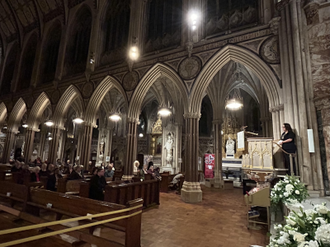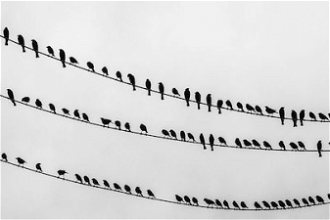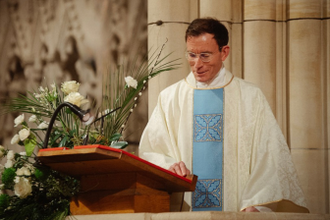Praying with St Francis' Canticle of the Creatures

Sr MaryAnne Francalanza FCJ Image:ICN/JS
An evening marking the 800th anniversary of the Canticle of Saint Francis took place in the Jesuit Church of the Immaculate Conception in Farm Street, yesterday.
After Mass for the Care of Creation celebrated by Fr Dominic Robinson, Sr MaryAnne Francalanza, Director of the FCJ Centre for Spirituality and EcoJustice gave this reflection:
Welcome again to this time of prayer and celebration. This year the Canticle of the Creatures, sometimes called the Canticle of the Sun, is 800 years old. How amazing that words written 800 years ago are still beautiful, inspiring, simple yet profound, and still very relevant to the situation we find ourselves in today.
First a little about St Francis of Assisi, the author of the Canticle. Francis lived in Assisi, in modern day Italy in the 11th Century. The son of a wealthy merchant, he spent a carefree life of privilege as a young man and dreamed of being a knight. When war came to Assisi however, he realised that the reality of war was not so glamourous. Assisi fell and he was imprisoned for a year, returning home ill and weak.
Francis learns the horror of war and the importance of peace.
While he recovered from his ordeal, his former life seemed empty and meaningless, and he felt lost. He took to wondering in the countryside around his home and one day in a church ruin he heard the words - 'go and repair my church.' This was the start of a different way for him.
As he grew in love with Jesus, he found himself wanting to ease the suffering of others, but at first when he encountered the reality of leprosy, it disgusted him. As he served and learnt to love the lepers, his life was transformed, and he claimed that the lepers had healed him. He was discovering true joy.
Francis learns the meaning of a life of service to others.
His father concerned at this life Francis was choosing, brought him before the court, and here Francis renounced his inheritance and the family name -choosing Lady Poverty as his companion. He realised that possessions do not bring meaning and can often be divisive.
Francis learns the joy of simplicity.
He discovered the richness of the natural world and had a great bond all creation - he preached to the flowers and the birds, calling all created things brother and sister. God was present to him in a very real way through creation. Later on he always wanted that part of each friary garden be set aside to be sacred land, allowed to grow wild, tended only by God.
Francis learns that God is to be found in all creation.
In his 40s his health began to fail. He composed songs, including the Canticle. It sprang from a deep sense of gratitude and overflowing praise to God, as well as joy in the family of all Creation.
Even this short recounting of Francis's life, shows many links with what inspired Pope Francis who took Francis of Assisi's name, and many links with the encyclical Laudato Si'.
Love for the Earth and love for the poor are intertwined in Francis' life, both lead him to God, to fulfilment, to joy. We are challenged to allow our hearts to really listen to the Cry of the Earth, and the Cry of the Poor. It calls us to generosity and self-giving.
Stories of Francis of Assisi preaching to the birds and flowers have a 'cute' factor and children love them, but there is a deeper, more radical theology at play here. Calling creatures sister and brother means that they are now part of our family. It reminds us of our unity, our interdependence, of the kinship between us.
If we notice the wording of the Canticle, Francis is saying 'all praise to you through Brother Sun ...'. The praise goes to God not only through Francis but through each created thing. They have agency, they give praise to God by being and doing what they were created to be and do. The sun by bringing light, the moon by being bright and fair, the wind by its various moods, etc.. And so must we. Humanity must give praise to God by being and doing what we were created to do - be peacemakers, justice-makers, reconcilers, gardeners, lovers. When we do the opposite, when we are selfish, divisive and unforgiving not only are we not praising God, but according to Francis, we are also not being fully human.
Laudato Si tells us that "if we feel intimately united with all that exists then sobriety and care will whirl up spontaneously. (LS, 11) How am I sober in my use of Earth's resources, in reflecting on the difference between what I want with what I truly need? What choices are coming out of my care for Creation? Who is Francis' Lady Poverty for me?
If we truly live this kinship with our sisters and brothers in all Creation, would we destroy the homes of our kin? Would we mine them for resources? Would we poison their food, and the air they breathe? Would we farm them for food? Laudato Si' reminds us that Francis' relationship with creatures - sister moon, brother wolf - "cannot be written off as naive romanticism for it affects the choices which determine our behaviour." (LS, 11) What different choices might I need to make?
Francis of Assisi wrote this canticle when he was terribly ill, in pain and almost totally blind. In his physical illness and suffering he was able to offer praise. As we grieve for our Earth and the world's poor - human and more than human - let us also find the place of gratitude, praise and deep joy that enables us to offer ourselves in generous service.
I was touched that Pope Leo yesterday at the Raising Hope Conference in Rome, quoted this part of Laudato Si' that speaks of St Francis of Assisi. It reminds us that Francis of Assisi "shows us just how inseparable the bond is between concern for nature, justice for the poor, commitment to society, and interior peace." (LS, 10)
The prayer spaces you are invited to explore this evening will hopefully help you reflect on the connection within you between your concern for nature, justice for the poor, commitment to society, and your own interior peace.
"Nature is a magnificent book in which God speaks to us and grants us a glimpse of infinite beauty and goodness. Rather than a problem to be solved, the world is a joyful mystery to be contemplated with gladness & praise." (LS, 12) Let us take time to contemplate this evening and pray for the grace of ecological conversion.
After Sr MaryAnne's reflection there was time to visit some beautiful reflective spaces around the church organised by Pax Christi, Columban Missionaries, Caritas Westminster, Jesuit Missions, Laudato Si Movement, Green Christian, Christian Climate Action, Spirituality and Eco Justice and CAFOD, before refreshments in the Aruppe Hall.
Visit ICN's Facebook page to see more pictures from the evening.
LINKS
Pope Francis, Laudato Si': On Care for Our Common Home: www.vatican.va/content/francesco/en/encyclicals/documents/papa-francesco_20150524_enciclica-laudato-si.html (quoted in the above reflection as LS)
Reflections and writings from the Poor Clare Sisters in Arundel, UK: www.poorclaresarundel.org/
Daniel P Horan, 'After 800 years, St. Francis' 'Canticle of the Creatures' still offers radical vision': www.ncronline.org/opinion/guest-voices/after-800-years-canticle-creatures-still-offers-radical-theological-vision
Video: The Canticle of Creatures, Word on Fire Institute: www.youtube.com/watch?v=hFTpT-eTjPM&t=395s
FCJ newsletter: https://bit.ly/FCJHouseSignUp
FCJ on Facebook: www.facebook.com/FCJSpiritualityCentreLondon
The FCJ Centre for Spirituality and EcoJustice is a ministry of the sisters, Faithful Companions of Jesus: www.fcjsisters.org


















